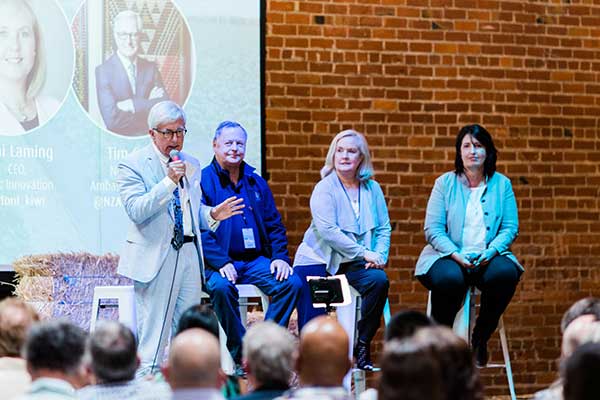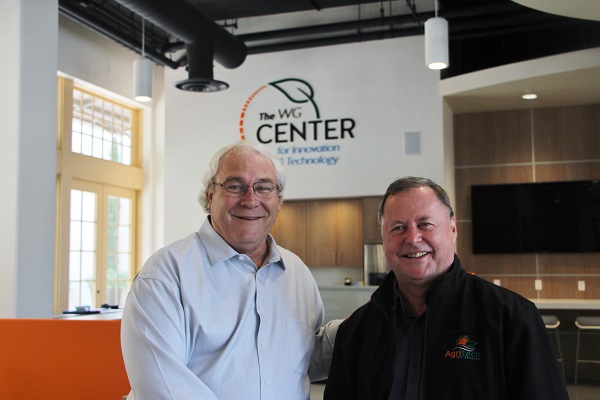Last month, I had the opportunity to visit eight cities and meet over 500 people during our 2018 roadshow. Many thanks to all our hosts, members and readers who attended the events, it was an awesome three weeks!
During the roadshow, I was able to provide insight on key initiatives that Agritech New Zealand is currently engaged in, including:
- the strategic importance to our sector of becoming Farm2050’s first ‘Country Partner’ and the opportunity this provides emerging, disruptive New Zealand businesses to work on some of the really big problems facing the world’s agricultural industry. This partnership also provides access to both connected global capital and a number of major international agribusinesses.
- partnering with Western Growers, North America’s largest producers of fresh produce, to address key challenges around labour and the need to automate more on-farm processes and applications. This is creating significant new commercial pathways for New Zealand agritech businesses to enter a major offshore market.
- working with Callaghan Innovation and NZTE to ensure that New Zealand’s agritech sector takes full advantage of the upcoming Trans-Tasman agritech conference, evokeAG. This is being held in Melbourne from 19–20 February 2019.
- designing a major one day event during Fieldays 2019 to showcase the best of New Zealand agritech to our farmers, growers and orchardists, as well as international delegates. This will take place in the Bledisloe Centre at Mystery Creek on 13 June 2019.
- establishing working groups that address key challenges facing the primary sector. These groups will make recommendations to Government for potential policy and regulation setting changes, where appropriate, to improve the productivity and sustainability of the sector.
- supporting a major new initiative to identify disruptive technologies in nutrients; both from a standpoint of application, measurement and efficiency, as well as novel nutrient technologies such as microbiome/soil health technologies.
There is plenty more in the pipeline and I will be working with Agritech New Zealand’s Executive Council so we can soon share more of our work programme plans.
Later this month, I will be travelling to the AgTech Nexus Europe conference in Dublin. I will be meeting several prominent members of the Farm2050 collective and meeting representatives of Enterprise Ireland to discuss participation in next year’s Irish Ploughing Championships. This is a major opportunity for New Zealand’s dairy tech sector.
I look forward to reporting back from Ireland next month, in what will be the final Agritech New Zealand newsletter for 2018.
Ngā mihi
Peter Wren-Hilton
Executive Director
Welcoming our new members this month
Blinc Innovation
Callaghan Innovation
Cucumber
Data Engineers
Farmlands Cooperative
Fonterra Cooperative
Gallagher Group
HGM Legal
Information Power (Vinea Software)
IoA
KPMG
Livestock Improvement Corporation (LIC)
Meander
Ministry of Business, Innovation & Enterprise (MBIE)
New Zealand National Fieldays
New Zealand Trade & Enterprise (NZTE)
New Zealand Venture Investment Fund (NZVIF)
NZ Controls
Onfarm Data
PAANZ
Priority One
Regen
Spacebase
Spark New Zealand
Sprout Accelerator
VirtualSpace
Woodhaven Gardens
Zag (Solitus NZ)
Zespri
NZ HI-TECH AWARDS – Open for entries soon!
UpStarters – Share our Tech Story
NEWS
Did you know that Canterbury has over 70% of New Zealand’s irrigated land? Learn more at Blinc Innovation’s Creating a Sustainable Farming Future at the New Zealand Agricultural Show, 14-15 November in Canterbury. Seminars include biosecurity, innovation and water resilience.
Connect with the New Zealand delegation at evokeAG, 19-20 February, 2019 in Melbourne. Discussions include AgData, AI, food provenance, robotic farming, new value chains and more. Early bird tickets have been extended till 11 November.
Join the New Zealand IoT Alliance’s first Connect Event on 20 November in Auckland. Discussion includes security analysis and IoT at the edge
Register for the 2019 Sprout Accelerator cohort. Entries for the inaugural #TechRocketshipANZ close 23 November.
In international news, New Zealand has once again topped the World Bank’s ranking of the best country to start and run a business!
Missed Microsoft’s Future Now event in Auckland last month? Watch the keynote talks here. Also, view the highlights from the TIN100 report.
Learn more about Google’s AI for Social Good programme, including the AI Impact Challenge, to help solve some of the world’s biggest challenges! Applications close 22 January.
Entries for the 2019 Hi-Tech Awards open on 3 December. Join the launch events on 28 November in Auckland, 5 December in Wellington and 6 December in Christchurch. Save the date for the Awards Gala Dinner on 24 May in Auckland.
Agritech New Zealand is a membership funded organisation, so if you are not already a member, please consider joining us. Have you been forwarded this newsletter? Receive your own copy each month, simply subscribe here.




